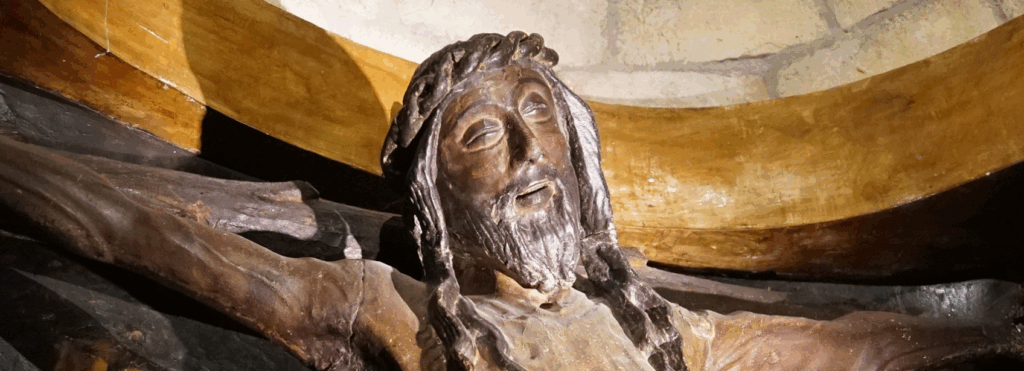I remember observing a little girl of seven or eight entering a chapel in the Cathedral of Madrid, Spain, and being startled by a particularly gruesome crucifix with the tortured body of Jesus hanging from it. She immediately burst into tears, and asked in Spanish, “who would leave something so scary in the Church for everyone to see?”

‘The smiling Christ’ of Javier
Is there any act of Christian devotion that could be more out of step with a worldly perspective than the exaltation of the Cross? To elevate the Cross as an object of reverence might seem to some like the exaltation of a firing squad or an electric chair, or the toxic injections given to execute criminals for capital crimes. (It is a wonder that such inhumane practices of punishment and, theoretically, deterrence are still used in some of our societies, and in those places, the Catholic Church often works to end this barbaric practice). For those outside of the Christian tradition, this celebration can be shocking and incomprehensible, as if to elevate this kind of capital punishment, or the terrible suffering and death caused by this torturous form of execution, once a method for terrorizing an occupied state, of subduing crime and rebellion in the Roman Empire.
We can appreciate the reaction of this little girl, stepping back to see with fresh eyes, and perhaps to wonder ourselves exactly what it is that the Church is celebrating in the Exaltation of the Cross?
Theologically, this feast of the Church is not intended to celebrate any of these things mentioned. Rather, this feast celebrates what happens on the Cross through the self sacrificial offering of Jesus of Nazareth, this innocent man wrongly sentenced to death. On the Cross, Jesus expressed through his suffering the infinite love and mercy of his Father, the unmerited forgiveness of our sins. Jesus transforms the very nature of innocent suffering and accepts his Passion and death for the sake of this love.
This is the source of our redemption in the Paschal mystery, that God so loved the world that he gave his son for us. We do not believe that in the Passion God is approving of capital punishment, nor any violence for that matter. Neither is God reversing the ancient teaching of the prophets, who one after another told the people that it is “mercy, not sacrifice,” that God desires.
Yes, we describe Jesus as the “lamb,” and there are many scriptures that recapitulate the notion of a propitiatory offering to appease God’s wrath at our sinful humanity; yet, the theology of the Gospel writers, (especially John) suggests that for Jesus himself, in this new Passover, he is not being sacrificed as a victim. Rather, Jesus, the Incarnate second person of the Trinity, chooses to accept his Passion and death in order to express to the fullest extent what God has desired to self-communicate from the beginning, that God is Love and will love us utterly and completely to the end, despite everything.
What might we as leaders make of this celebration today, and what personal relevance might it have for us in our roles of service and responsibility?
I know many religious superiors, and those missioned to roles of authority, who literally number the days of their tenure of office, essentially counting down until their service is ended and they are released for some other assignment. I am not judging. So often, in the context of the Church, we don’t desire the burden of these complicated and challenging roles, and would prefer to be serving people in other forms of ministry. For many, leadership is a cross, and can feel like an unwanted burden that produces more personal suffering (loneliness, stress, physical symptoms, etc.) than satisfaction, let alone fulfillment.
But inspired by Jesus’ example, I have also witnessed such leaders, with grace, accept and embrace this cross only to discover that when they do so with freedom and in a spirit of love for those whom they serve, their previous sense of burden is lightened, and that their suffering is often transformed. It is not some grim resignation that produces this change, but truly, the work of God’s grace, the inspiration of the Holy Spirit, and the power of love for others, for one’s mission, that makes the difference.
If you are one of those leaders who does not see how this current role and responsibility matches your sense of calling or your preferences for ministry and service, is there some room within your heart, some desire to pray for the grace of this kind of transformation? What would you need to surrender? What might you accept to be possible or true?
With you together on the road,




